How Much For Rewiring 3600 sq ft House?
At Estimate Florida Consulting, we understand the importance of accurate cost assessments. For rewiring a 3,600 sq ft house, the cost typically ranges from $21,600 to $72,000, calculated at an updated rate of $6 to $20 per square foot. This revised estimate accounts for various factors that can influence the final cost, including the complexity of the electrical system, the condition of the existing wiring, specific rewiring requirements, and regional variations in labor rates. Our process ensures your home’s electrical system is safely upgraded to current standards, and we advise homeowners to include a contingency for unforeseen issues that may arise during the project, impacting the total cost.

Electric Wire Cost by Material
More than 22 cable types are used in residential buildings, but not all are common or something used in every house. Electrical wires are made of copper or aluminum and may be insulated or sheathed in various materials, such as PVC. Each electrical wire may be hot, grounded, or neutral, depending on its purpose. In most cases, the wiring cost is included in the labor cost.
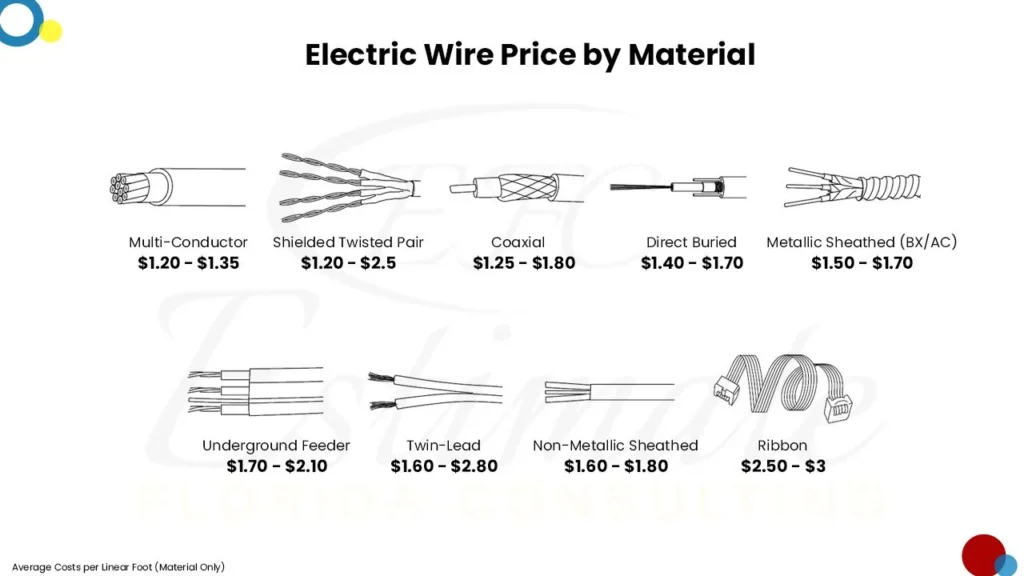
| Type | Average Costs per Linear Foot (Material Only) |
|---|---|
| Multi-Conductor | $1.20 – $1.35 |
| Shielded Twisted Pair | $1.20 – $2.5 |
| Coaxial | $1.25 – $1.80 |
| Direct Buried | $1.40 – $1.70 |
| Metallic Sheathed (BX/AC) | $1.50 – $1.70 |
| Underground Feeder | $1.70 – $2.10 |
| Twin-Lead | $1.60 – $2.80 |
| Non-Metallic Sheathed | $1.60 – $1.80 |
| Ribbon | $2.50 – $3 |
Hire Professional Contractors
The Basics of House Rewiring
House rewiring is a crucial aspect of home improvement that involves upgrading the electrical system to ensure safety and efficiency.
By rewiring a house, homeowners not only increase the safety of their living space but also enhance energy efficiency, leading to cost savings in the long run. House rewiring allows properties to meet current electrical standards and regulations, ensuring compliance and reducing the risk of electrical hazards.
The rewiring process typically involves replacing outdated wiring, upgrading circuits, and installing modern electrical components to meet the power requirements of today’s appliances and devices. It is crucial to hire a professional electrical contractor for house rewiring projects to guarantee quality workmanship and adherence to safety protocols.
What is House Rewiring?
House rewiring refers to the process of replacing or upgrading the electrical wiring in a residential property to ensure safety and functionality.
During a rewiring project, various components of the electrical system are typically upgraded, such as the wiring, circuit breakers, outlets, and electrical panels.
Proper wiring is crucial for protecting residents from electrical hazards and preventing potential fire risks. Adhering to electrical standards, such as using appropriate wire gauges and materials like copper conductors, is essential for ensuring the longevity and efficiency of the electrical system.
By investing in house rewiring, homeowners can enhance the overall safety and performance of their homes, reducing the likelihood of electrical malfunctions and ensuring a reliable power supply.
Why is House Rewiring Necessary?
House rewiring is necessary to address electrical hazards, upgrade outdated wiring, and improve the overall safety and functionality of a home.
Over time, outdated electrical wiring can become worn out, leading to fraying, cracks, or exposed wires which can pose serious safety risks like electrical shocks or fires. By opting for house rewiring, homeowners can ensure that their electrical system is up to date and meets current safety standards.
Aside from reducing the risk of electrical fires, rewiring also enhances the property’s value, as modernized electrical systems are attractive to buyers and can increase the market appeal of the house. Rewiring guarantees compliance with current electrical codes, providing peace of mind to homeowners and ensuring the safety and efficiency of their electrical setup.
Factors That Affect the Cost of House Rewiring
The cost of house rewiring can vary based on several factors that influence the complexity and scope of the electrical project.
Factors such as the size of the house play a crucial role in determining the cost of rewiring. Larger homes typically require more wiring and labor, leading to higher expenses.
The accessibility of the existing wiring can impact the difficulty of the job. For instance, houses with wiring hidden behind walls or within ceilings may require more extensive work, driving up the overall cost.
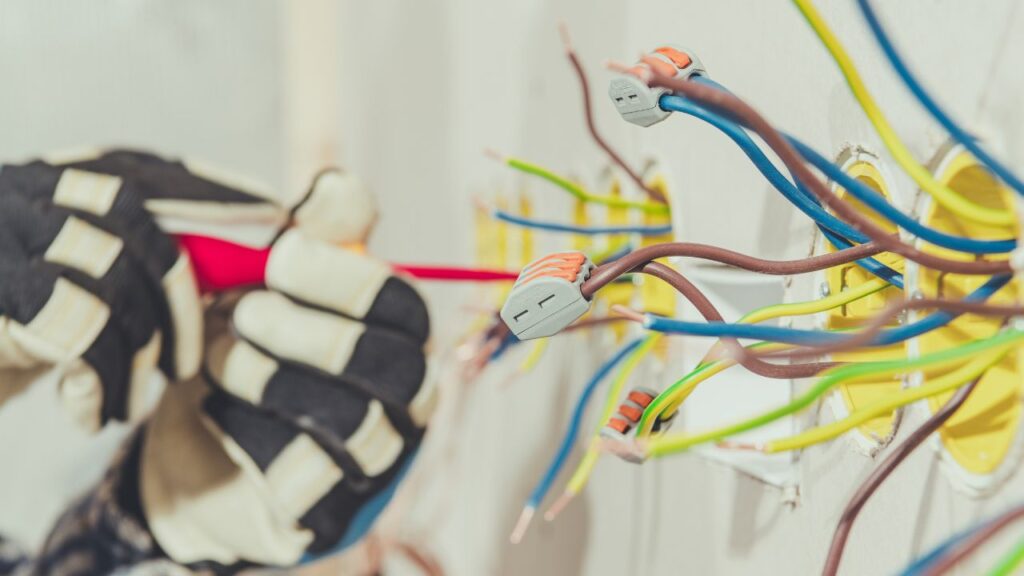
The type of wiring materials used is another significant cost consideration. High-quality materials, such as copper wiring, are more expensive than alternatives like aluminum.
Understanding these factors can help homeowners estimate the expenses involved in a house rewiring project.
Cost to Rewire a House by Location
When you’re considering the cost to rewire a house, there’s a lot to take into account, especially when you’re focusing on rewiring a single room. The expenses can vary depending on the scope of the job and whether there’s already a remodel in progress. If you’re undertaking a full remodel and the walls are open, the cost of rewiring might not significantly increase your expenses. However, if you’re simply rewiring without any major renovations, particularly if accessing the wiring is challenging, the costs can rise. It’s kind of like a sliding scale, ranging from what you’d expect during a remodel to potentially higher costs if the job gets tricky.
So, it really depends on the specifics of your situation.
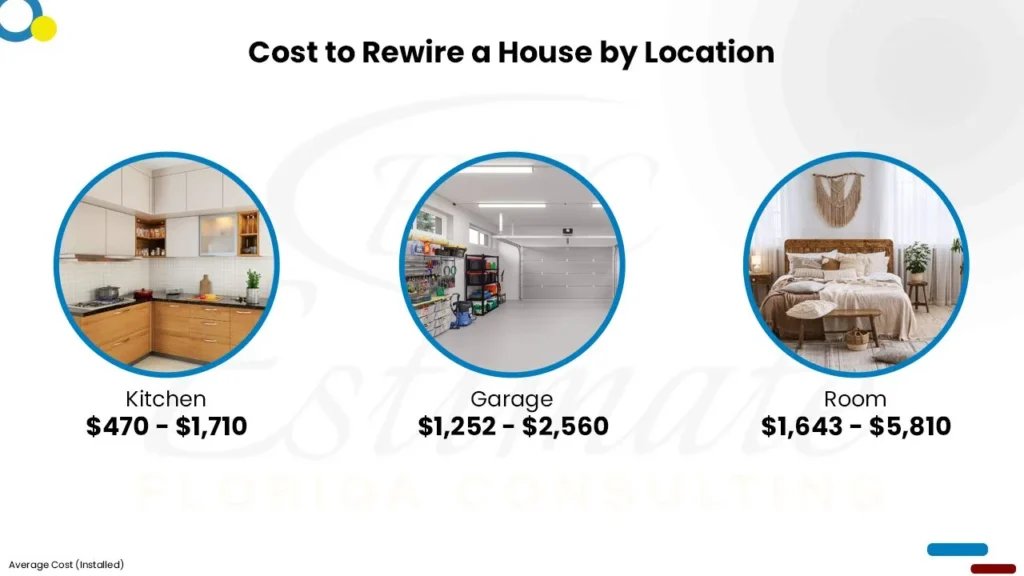
| Location | Average Costs (Installed) |
|---|---|
| Kitchen | $470 – $1,710 |
| Garage | $1,252 – $2,560 |
| Room | $1,643 – $5,810 |
We Provide 3D Rendering Services!
For Commercial and Residential Building
Turnaround time is 1-2 days
Win More Projects With Us
Size of the House
The size of the house, often measured in square footage, plays a significant role in determining the cost of a rewiring project due to the amount of wiring upgrade required.
Spacious homes with larger square footage not only require more wiring materials but also entail additional labor for installation. The complexity of rewiring increases as the size of the property expands, as more circuits and outlets need to be installed to ensure adequate coverage.
Accurate square footage measurements are crucial in estimating the total cost of the project, as it helps electricians determine the exact amount of materials and labor needed for a successful wiring upgrade. Consequently, comprehensive planning and precise calculations are essential when embarking on rewiring a larger home to avoid unexpected expenses.
Accessibility of Wiring
The accessibility of existing wiring within a house affects the ease of rewiring and may require obtaining electrical permits to ensure compliance with safety standards.
When embarking on a house rewiring project, having easy access to existing wiring can streamline the process and save both time and effort. It is crucial to ensure that the rewiring work meets electrical standards and regulations to guarantee the safety and functionality of the electrical system. Obtaining electrical permits for rewiring work is not only a legal requirement but also essential for maintaining the integrity of the home’s electrical infrastructure. Adhering to industry standards not only ensures safety but also enhances the overall quality and longevity of the electrical system.
Type of Wiring Materials
The choice of wiring materials, such as copper or aluminum, impacts the cost and longevity of a rewiring project, as different materials offer varying levels of durability and performance.
When it comes to house rewiring, selecting the right wiring material is crucial for ensuring the safety and efficiency of the electrical system. Copper wiring is known for its excellent conductivity and heat resistance, making it popular for homes. On the other hand, aluminum wiring, though less expensive, may require special connectors due to its tendency to oxidize. The quality of electrical circuitry materials can directly influence the adherence to electrical standards, such as the National Electrical Code, and play a significant role in proper circuitry design for optimal performance.
Download Template For Wiring & Rewiring Project Breakdown
- Materials list updated to the zip code
- Fast delivery
- Data base of general contractors and sub-contractors
- Local estimators

Complexity of the Job
The complexity of a rewiring job is influenced by factors such as the number of circuits, outlets, and fixtures involved, requiring a detailed electrical rewiring process and accurate wiring diagrams.
When embarking on a house rewiring project, it is essential to consider the intricacies involved in rewiring multiple circuits, installing new outlets, and updating fixtures. Each additional circuit adds complexity to the project, as it requires meticulous planning and precise execution to ensure safety and compliance.
Installing new outlets demands careful consideration of placement for convenience and functionality. Upgrading fixtures, such as lighting and switches, not only impacts the aesthetic appeal of a space but also contributes to the overall efficiency and productivity of the electrical system.
Location of the House
The location of a house can influence the cost of rewiring, with factors like local electrical service providers and potential hazards affecting pricing and project timelines.
For instance, in areas with limited access to specialized electrical service providers, homeowners may face higher costs due to increased demand and competition among the few available providers.
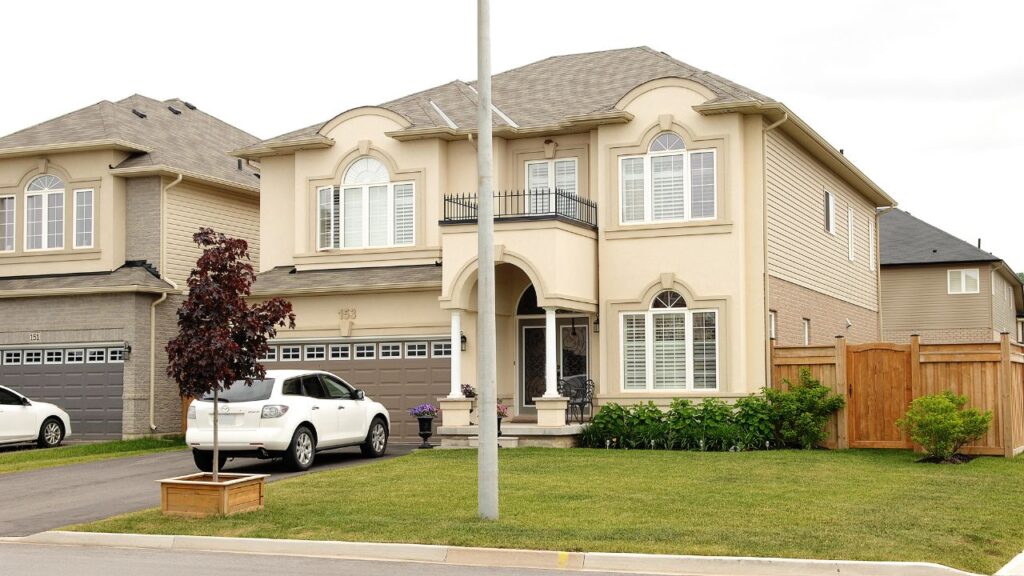
The availability of specific materials required for rewiring projects can vary depending on the region, impacting both cost and duration. Considering local factors such as regional electrical codes and safety regulations is crucial to ensure compliance and avoid costly delays or rework.
Being aware of specific electrical hazards prevalent in certain geographic locations can also help homeowners make informed decisions when planning a rewiring project.
How Much Does House Rewiring Cost?
Determining the cost of house rewiring involves assessing various factors, obtaining estimates, and setting a realistic budget for the electrical project. Homeowners can begin by reaching out to licensed electrical contractors in their area to request quotes. Rewiring costs typically range from $6 to $20 per square foot, with a standard-sized home costing a few thousand dollars or more. Factors influencing the cost include the size of the house, existing electrical setup, and desired upgrades. Comparing estimates allows homeowners to consider material quality, labor costs, and project timelines when setting a budget aligned with their needs and preferences.
Average Cost for a 3,600 sq ft House
The average cost to rewire a 3,600 sq ft house can vary widely, typically ranging from $21,600 to $72,000. This estimate is based on an average cost of $6 to $20 per square foot. The total cost depends on various factors such as the complexity of the electrical system, the condition of existing wiring, and regional labor rates. Homeowners should obtain quotes from licensed electrical contractors to get a more accurate estimate tailored to their specific needs and circumstances.
Cost Breakdown of Materials and Labor
The cost breakdown of house rewiring includes expenses for electrical materials, labor costs, and any necessary repairs to ensure the safety and functionality of the electrical system.
When budgeting for house rewiring, it’s crucial to consider the separate components of the overall cost. Material expenses encompass items such as wiring, outlets, switches, and electrical panels. These materials are essential for updating and modernizing the electrical infrastructure of a home.
Labor charges are another significant factor to account for, as skilled electricians play a key role in ensuring the rewiring process is executed safely and up to code. It’s important to have a contingency fund for potential unforeseen repairs that may be uncovered during the rewiring project.
By carefully planning and budgeting for both labor and materials, homeowners can prioritize safety and efficiency in their electrical maintenance and repair services.
Hire Professional Contractors
Additional Costs to Consider
In addition to the primary costs of house rewiring, homeowners should be aware of potential additional expenses related to electrical safety measures, fuse box replacements, and unexpected upgrades.
Investing in electrical safety enhancements such as updating outlets to include GFCI protection or installing surge protectors can add to the overall budget but are crucial for safeguarding against electrical hazards.
Fuse box replacements may be necessary to ensure compliance with current codes and to handle the increased electrical demands of modern appliances and devices.
Unforeseen wiring upgrades, like addressing outdated wiring or ensuring proper grounding, are often discovered during the rewiring process, underscoring the importance of setting aside a buffer for such contingencies.
Signs That Your House Needs Rewiring
Recognizing the signs that indicate the need for house rewiring is essential in preventing electrical hazards and ensuring the overall safety of your home.
Common indicators that suggest a house requires rewiring include flickering lights, frequently tripped circuit breakers, or outlets that feel warm to the touch. If your home has outdated wiring, such as knob and tube or aluminum wiring, it’s crucial to consider a rewiring project.
Warning signs like burning smells, scorched outlets, or sparks when using electrical appliances should never be ignored. Delaying rewiring can lead to serious risks, such as electrical fires, electric shocks, or even damage to your electronic devices. Prioritizing the prompt addressing of electrical concerns is vital to safeguarding both your property and your family.
Frequent Electrical Issues
Experiencing frequent electrical issues, such as tripped circuit breakers or power outages, may indicate underlying wiring problems that necessitate a thorough electrical inspection and potential rewiring.
These warning signs should not be overlooked, as they could lead to more serious problems if left unaddressed.
Flickering lights, for example, may seem minor but could point to loose wiring connections or overloaded circuits.
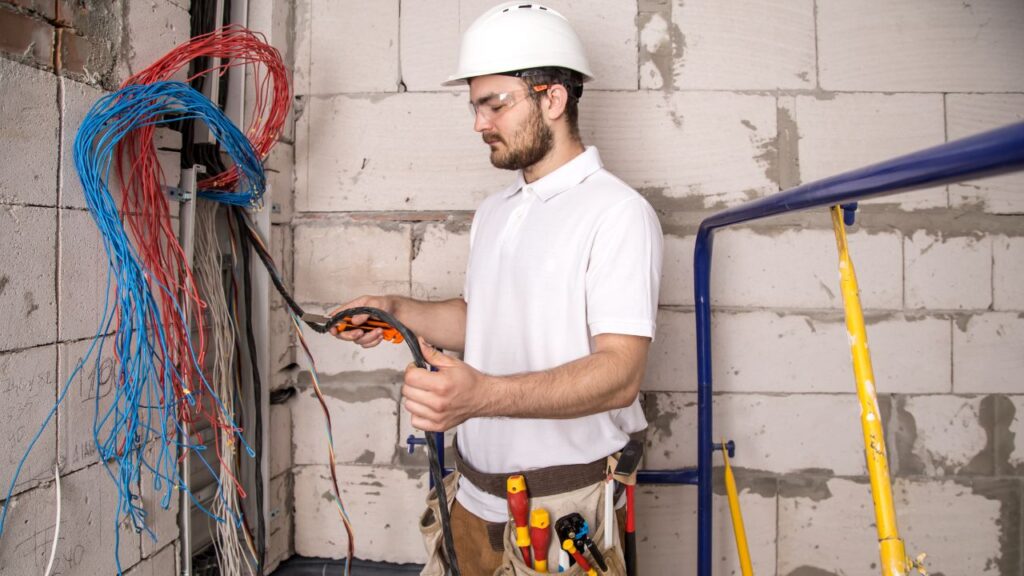
Power surges can also be a sign of faulty wiring that poses a fire risk.
By promptly addressing these issues, homeowners can prevent safety hazards and the potential need for extensive repairs in the future. Investing in a professional electrical inspection can help identify and rectify these problems before they escalate.
Outdated Wiring
Outdated wiring that does not meet current electrical codes or safety standards should prompt homeowners to consider a rewiring project to modernize their electrical system.
This is crucial because outdated wiring poses serious risks such as electrical fires, short circuits, and even electrocution due to worn-out insulation or faulty connections.
Using obsolete wiring materials like knob-and-tube wiring or aluminum wiring can lead to overheating and increased energy consumption.
Upgrading to modern standards not only enhances safety but also improves energy efficiency, reducing the risk of electrical hazards and potentially increasing the overall value of the property.
It’s essential for homeowners to prioritize electrical safety by complying with current regulations and ensuring that their wiring is up-to-date.
Burning Smell or Sparks
The presence of a burning smell or sparks from electrical outlets or fixtures signifies potential hazards that require immediate attention through professional electrical repair or rewiring.
These warning signs could signal underlying issues such as faulty wiring, overloaded circuits, or damaged insulation, which, if left unaddressed, can lead to electrical fires or other dangerous situations.
It is crucial to prioritize the safety of your home or workplace by promptly seeking the expertise of a qualified electrician to conduct a thorough inspection and mitigate any potential risks.
Neglecting these warning signs can not only jeopardize the functionality of your electrical system but also put your property and occupants at serious risk of harm.
Are You Looking For?
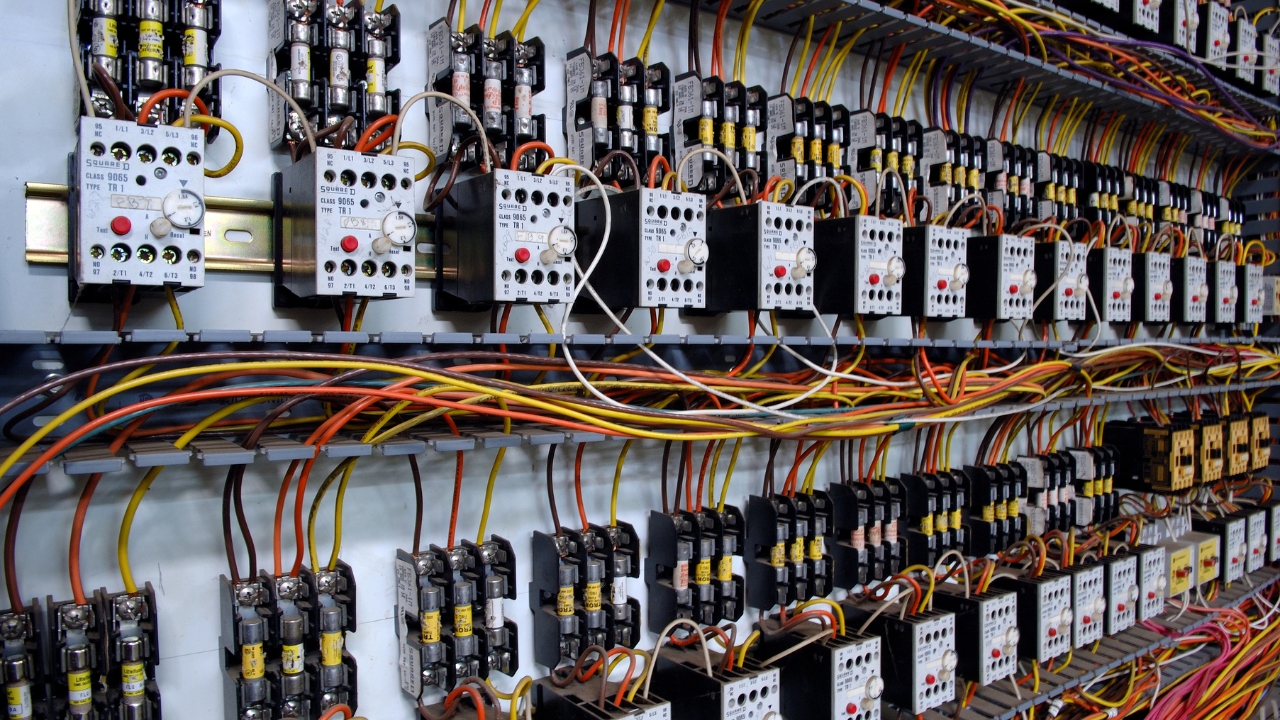
Fully Insured License
Hire Contractors & Subcontractors
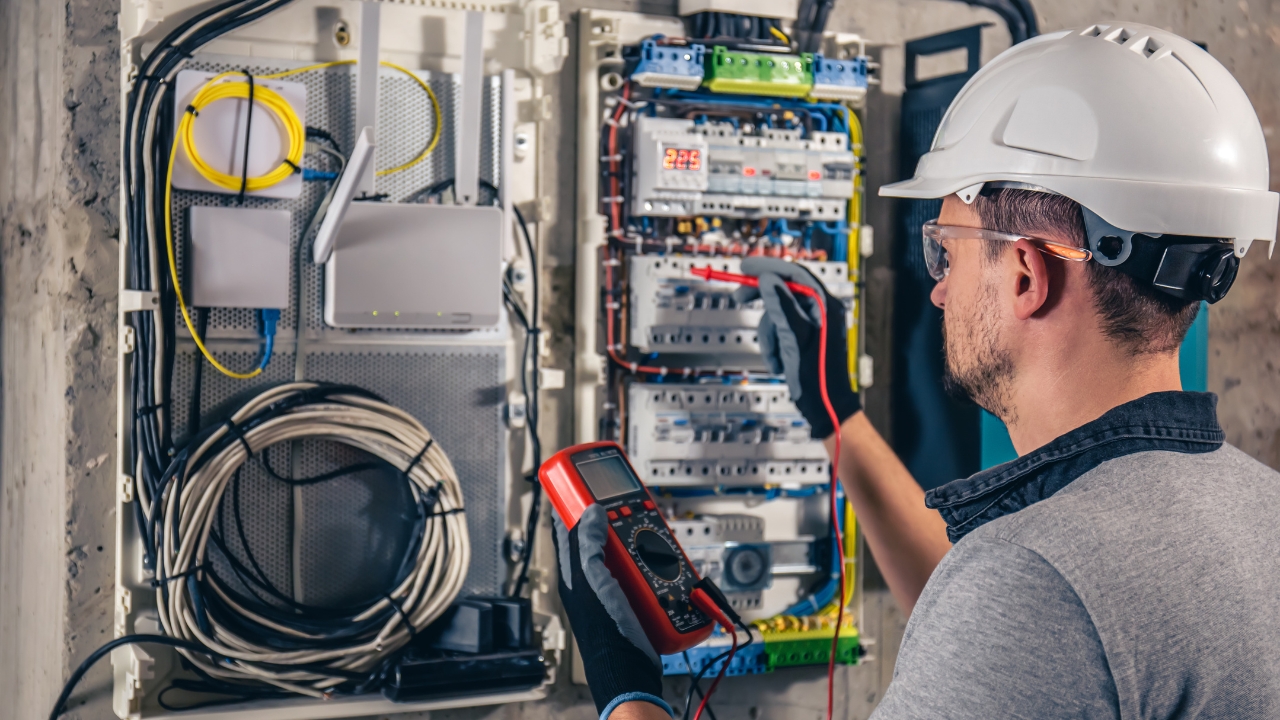
Make Informed Design Decisions Showcase Your Design Ideas
Get RenderingCall Us To Discuss More at 561-530-2845
Flickering Lights
Flickering lights are often indicative of poor wiring connections or electrical circuitry issues that may necessitate rewiring to meet modern electrical standards and ensure proper functionality.
Ignoring flickering lights can lead to potential safety hazards like electrical fires or shocks. By addressing the root cause through rewiring, homeowners can not only enhance the safety of their electrical systems but also improve energy efficiency.
Upgrading to newer wiring technology can reduce energy waste, ultimately lowering utility bills. Rewiring can optimize the performance of lighting fixtures, ensuring a consistent and reliable illumination throughout the home.
It’s crucial to consult with a professional electrician to determine the extent of rewiring needed based on the specific issues identified.
Tripped Circuit Breakers
Frequent tripping of circuit breakers indicates overloaded circuits or faulty wiring, necessitating an electrical inspection to identify potential hazards that may require rewiring for resolution.
When circuit breakers trip frequently, it’s a clear sign that something isn’t right with the electrical setup in the property. Overloaded circuits can lead to overheating and potential fires if left unaddressed. Faulty wiring poses risks of short circuits and electrical shocks, putting both the property and its occupants in danger.
To ensure the safety and functionality of the electrical system, it’s crucial to conduct a thorough electrical inspection. By diagnosing any wiring issues accurately through inspection, rewiring can be strategically implemented to prevent future overloads and maintain a secure environment in residential settings.
Conclusion
Rewiring a 3,600 sq ft house is a significant but essential investment, with costs ranging from $21,600 to $72,000, or $6 to $20 per square foot. This process, crucial for safety and compliance with current electrical standards, should be handled by professionals due to the complexities involved. Estimate Florida Consulting’s comprehensive assessment ensures that homeowners receive an accurate, tailored estimate, considering the unique requirements of each home and regional cost variations. Homeowners are advised to prepare for any unforeseen challenges during the project. Investing in proper rewiring not only enhances safety but also upgrades the home’s functionality and efficiency.
FAQs:
At Estimate Florida Consulting, we find that rewiring a 3,600 sq ft house typically ranges from $21,600 to $72,000. This is based on an updated rate of $6 to $20 per square foot. The cost variation depends on several factors including the complexity of your home’s electrical system, the state of the existing wiring, specific requirements for the rewiring, and regional labor rates.
Home rewiring is crucial for safety, functionality, and compliance with current electrical standards. It addresses potential hazards associated with old or faulty wiring, such as electrical fires, and ensures the system can meet modern electricity demands. It’s particularly important in older homes where wiring may be outdated.
Indicators that your home may need rewiring include frequent electrical issues like power outages or flickering lights, a burning smell from outlets, outdated wiring systems, and any visible wear or damage to wires. These signs suggest inefficiency and potential safety hazards in the electrical system.
The cost of home rewiring can be influenced by various elements, including the overall size of the house, the age and accessibility of the current wiring, the types of materials used, and regional differences in labor costs. The complexity of the rewiring project also plays a significant role in determining the total expense.
It is generally not advisable for homeowners to undertake rewiring projects themselves due to the intricate nature and safety risks involved. Professional electricians are trained to handle such tasks efficiently and safely, ensuring compliance with electrical codes and standards. DIY electrical work can lead to errors, potential hazards, and increased costs in the long term.
Process To Get Rewiring 3600 sq ft House Estimate Report
Here I am going to share some steps to get your rewiring 3600 sq ft house estimate report.
-
You need to send your plan to us.
You can send us your plan on info@estimatorflorida.com
-
You receive a quote for your project.
Before starting your project, we send you a quote for your service. That quote will have detailed information about your project. Here you will get information about the size, difficulty, complexity and bid date when determining pricing.
-
Get Estimate Report
Our team will takeoff and estimate your project. When we deliver you’ll receive a PDF and an Excel file of your estimate. We can also offer construction lead generation services for the jobs you’d like to pursue further.
Google Reviews





